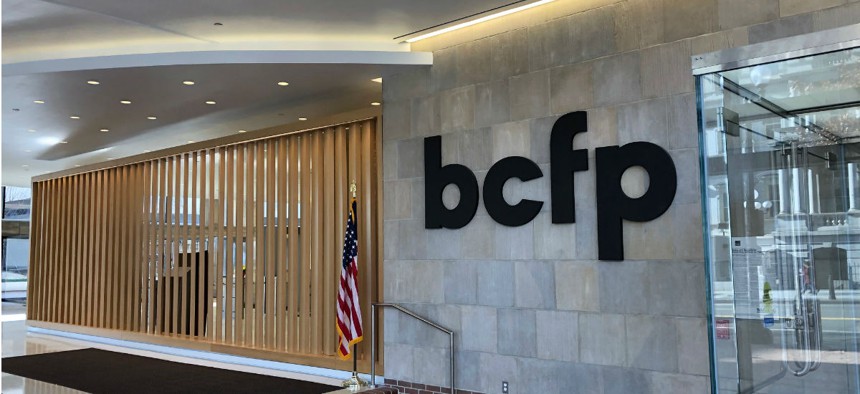
Acting Director Mick Mulvaney had the acronym changed in the lobby of the bureau's headquarters. Charles S. Clark/GovExec.com
Senate Confirms Consumer Bureau Nominee as Bureau Defends Name Change
Internal analysis had shown acting Director Mulvaney’s new acronym costing $300 million.
The Senate on Thursday, in a squeaker vote of 50-49, confirmed White House homeland security specialist Kathy Kraninger to be director of the Consumer Financial Protection Bureau.
The vote came as the agency was defending the move taken earlier this year by acting Director Mick Mulvaney to change the bureau’s name to the language used when it was created under the 2010 Dodd-Frank Wall Street Reform and Consumer Protection Act—the Bureau of Consumer Financial Protection.
Mulvaney, who has been doubling as President Trump’s budget director, on Thursday quickly welcomed the Senate’s action. ”Next week begins a new chapter of service in Kathy's career,” he said in a statement. “The American consumer and our economy’s financial sector will benefit from her commitment, expertise and professionalism. This last year has been an important step in the history of the Bureau as we take our place among the most notable regulatory bodies of our country—and frankly the world. Like all transitions, it was not always as smooth as we would've all liked, but the Bureau has emerged stronger for it.”
Consumer groups reiterated their long opposition to Kraninger, criticizing her as unqualified and a protégé of Mulvaney, who has sharply redirected the bureau. “Kathy Kraninger has no record of consumer protection or holding big banks, predatory lenders and other financial scammers accountable,” said Karl Frisch, executive director of Allied Progress. “She has repeatedly refused to answer even the most basic questions about her record or her views on pressing consumer financial issues. Rather than reward her with a promotion, senators should have refused her nomination.”
Lisa Donner, executive director of Americans for Financial Reform, added, “The Senate majority has endorsed a CFPB nominee indistinguishable from Mick Mulvaney, who has done his level best to dismantle from within an agency that once won real results for American families hurt by Wall Street and predatory lenders. Kraninger has no track record at all of consumer protection, or of standing up for vulnerable people. To the contrary, at OMB she has played a hidden role in the appalling and immoral family separation policy.”
Kraninger’s confirmation drew praise from the conservative Consumer Action for a Strong Economy group. “After years of the CFPB being used for political purposes, the agency can finally return to its stated purpose of protecting consumers against actual fraud and abuse in the marketplace,” said its vice president, Gerard Scimeca. “Kathy Kraninger is the accomplished, sensible and principled leader the American people can trust to serve as a watchful eye over consumers’ financial well-being, as well as the tax dollars of every American.”
One of Mulvaney’s legacies, the name change to the government’s newest agency that had spent seven years building its brand, came into question this week when The Hill news outlet obtained an internal bureau document suggesting that the cost to the agency and industry could be as high as $300 million.
Several hundred banks, mortgage companies, payday lenders and credit card companies that the bureau regulates will be forced to “update internal databases, regulatory filings and disclosure forms with the new name in order to comply” with bureau rules, the Hill reported. “An agency analysis estimated that the changes necessary to comply with the Fair Credit Reporting Act, the Electronic Fund Transfer Act and certain mortgage regulations would cost firms $100 million for each rule.”
On Thursday, a bureau spokesman emailed Government Executive a statement saying the agency “remains committed to following the letter of the law. The Bureau also is committed to careful consideration of the potential burden of its actions and implementing policy in a deliberate and thoughtful way. Those considerations are ongoing, and the Bureau does not comment on such internal deliberations, and certainly not on unvetted preliminary assumptions and estimates.” The spokesman added: “I will note that cost to date of adherence to the statutory name has been negligible. I also welcome newfound concern from some quarters about the potential burden of Bureau activity upon regulated industry; I’d call that progress.”
The name change on the website of the bureau itself is a work in progress, with a goal of completing the adoption by March, the internal analysis said. (The home page still states, “We’re the CFPB.”) Mulvaney’s directive in June prompted replacing the large lettered sign in the bureau’s lobby—and he also removed the outdoor sign that the agency’s building sported under previous director Richard Cordray.
A quick Government Executive review shows that financial industry groups, such as the American Bankers Association and the Independent Community Bankers of America, took several months but by this fall had begun using the name Bureau of Consumer Financial Protection.
Journalists, however, as typified by the Associated Press, have continued using Consumer Financial Protection Bureau, including the New York Times, Washington Post, Wall Street Journal, American Banker and Government Executive.







